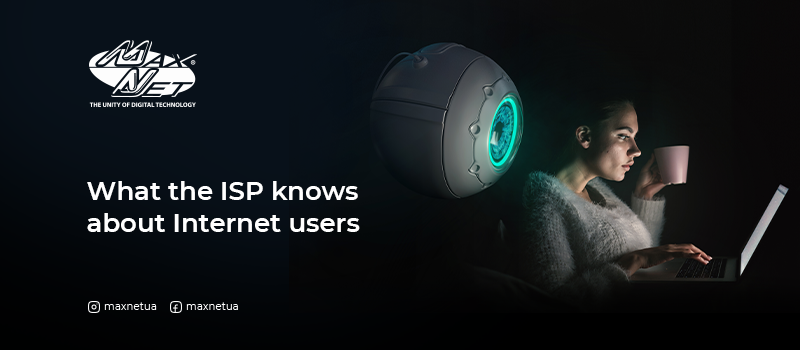
In today's digital age, can you expect complete privacy for your online activities? Obviously not. After all, it is no secret that data about us is collected for the purpose of launching adverts, conducting market research, etc. But is our every move known to the company that provides us with Internet services? Also no. What information about users is actually available to ISPs, you will learn from this article. In it, we have collected answers to the most popular questions from users of the World Wide Web on this topic.
Does the ISP see search queries?
On the Internet, all user queries first reach the ISP's server. It processes them and sends them to the servers of the site the user is accessing. The statistics for a certain period of time (week, month, quarter, year) include only information that certain network connections took place on the part of the Internet service user. But the very queries that the client enters into the search engine, the provider can see only in the form of addresses and record them in the log.
Does your ISP know what websites you visit?
Whether your ISP can access information about the websites you visit depends on the type of connection. There are several options here: HTTP and HTTPS.
If the connection is via the insecure HTTP protocol, the ISP has access to information such as:
- IP address;
- URLs of all sites you visit, including page views and actions on them;
- logins and passwords;
- all materials that you have posted on the site.
In other words, from a technical point of view, the provider can view everything you transmit online in unencrypted form.
If you are connected via the secure HTTPS protocol (a lock is displayed in the address bar of such pages), the provider knows the following data:
- IP address;
- URLs of the sites you visit (the internal pages you visit and your actions on them remain unknown in this case);
- time spent on the sites;
- volume of incoming and outgoing traffic;
- number of connections.
Therefore, you should use web resources with a secure connection or additionally use a VPN connection. However, it is still impossible to hide from advertising campaigns in this way. Therefore, after visiting selling sites, the adverts for the goods or services we viewed "catch up" with us on other web resources.
What information is available to the ISP when using a VPN, Tor or proxy?

If you use a VPN (virtual private network) service, information about incoming and outgoing traffic from internal networks (home or corporate) remains encrypted. The Internet provider sees only the fact of connection to the VPN server, the port numbers (yours and VPN's), the time of connection and the amount of data transferred.
But here it is worth noting that many users prefer free VPN services, and they have their disadvantages. In particular, connecting to them can significantly reduce the speed of the Internet connection. Also, some services may contain malware embedded in applications. Therefore, if you do use VPN services, choose reliable options.
When using proxy-server — so to say "light version" of VPN — the provider sees only connection to some server. Your IP address is hidden in this case.
As for Tor-browser: your ISP sets the fact that you are using it. But it is not able to see what sites you are visiting.
Does your ISP know the MAC addresses of your devices?
The MAC address allows you to understand from which specific device (PC, laptop, smartphone, tablet) you accessed a web resource. Since the MAC address is a component of the Ethernet protocol and is necessary for its operation, the Internet provider sees it within the local network. It is through this unique identifier that the equipment is bound to the user.
Does your ISP know what videos you watch on YouTube?
The ISP only sees what you watch in the form of traffic volume (this data is needed for statistics). Your video content preferences remain a mystery to the ISP.
If I access websites in incognito mode, can I hide what I'm doing?
By enabling incognito mode, you get a certain level of privacy. In this case, the browser will not save cookies, logins and passwords, browsing history and other data from sites. But the IP address, traffic volume and other information that is available during a normal visit will be known to the ISP.
Does your ISP see the files you downloaded?
The amount of traffic transferred, the source and destination IP address, and port numbers are things the ISP can see. But what exactly you are downloading remains unknown. This is entirely the responsibility of each Internet user.
Personal and business correspondence: does the ISP have access to it?
Don't worry: thanks to the fact that modern messengers and social networks use encryption, the provider can’t see the content of messages sent and received, posts and stories you have published.
Is your bank card number and CVV available to your ISP?

When making payments in online shops and other financial transactions using your bank cards, don’t worry about "interception" of their numbers or CVV by the provider. He won’t recognise sensitive data, because payment systems are careful about the security of transactions.
We can conclude that the provider doesn’t need to collect a "dossier" about your online activity. Besides, it requires financial expenses from its side. So, as long as you haven’t committed illegal actions in the online space, the information about your surfing on the net is interesting mainly from the point of view of collecting statistics. But keep in mind that at the official request of law enforcement agencies, the ISP can provide the data available to it about your interaction with the Internet network.
Еще комментарии








Лика
24.10.2023
5
0
Reply